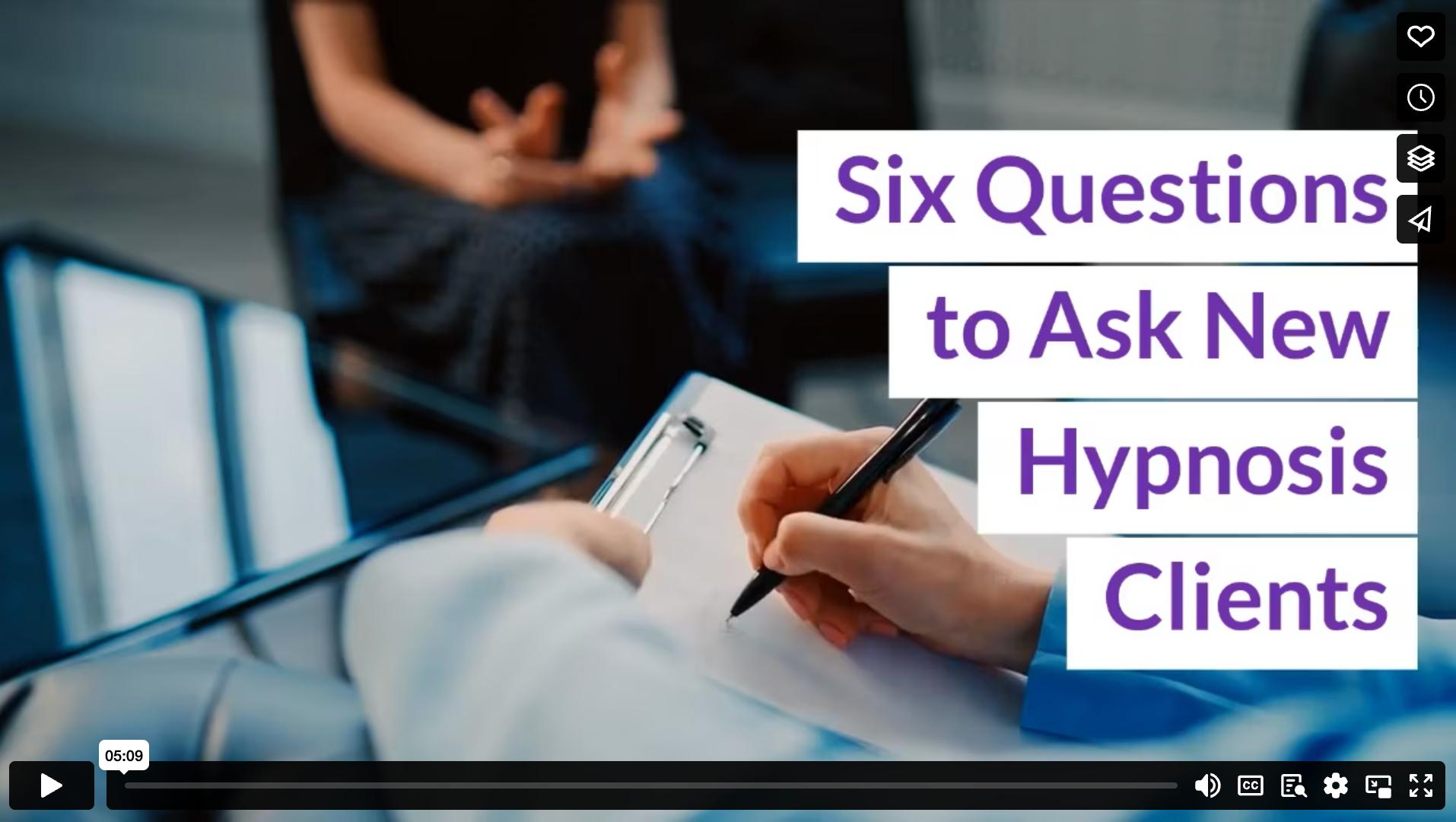Building trust and understanding with clients is critical to your success as a professional hypnotist. One way to foster trusting, comfortable relationships is through questions you ask during the beginning of your hypnosis process. These queries can help clients feel comforted, supported, heard, and understood. Thoughtful questioning can help you gather essential information while also strengthening the therapeutic relationship.
Your first interaction with a client sets the tone for your relationship. Done well, you create a sense of safety, comfort, and care. That allows clients to feel comfortable sharing concerns, goals, and deeply personal experiences. It also helps them relax and be in a better frame of mind to reach a hypnotic state.
Consider adding these questions to your initial consultation and conversations with new clients:
1. What Caused You to Seek Out Hypnosis?
As part of goal setting, you must know what challenges a client wants to address. Their goals may change, deepen, or expand during your relationship with them, but you need to know where to begin.
Why it matters: Understanding the primary reason a client seeks help allows you to tailor your approach. It also opens the door for the client to feel heard and validated.
2. Have You Tried Other Methods to Address This Issue?
You’ll want to know what other methods they’ve used (or are currently using) to address their challenges. If they are working through trauma, they may also be seeing a conventional therapist or taking medication. If they seek hypnosis to help with weight loss, you can learn more about the other methods they’ve tried or their current eating and fitness plans.
Why it matters: This information provides a clearer understanding of your client’s journey and struggles. It shows that you respect their prior experiences and allows you to tailor your approach to fit with what they are already doing.
3. Do You Have Any Concerns or Fears About Hypnosis?
Hypnosis can feel mysterious, confusing, or frightening to those unfamiliar with it. Asking this question opens the door for your client to share their fears. They may not bring up these fears because they are worried about offending you, looking silly, or asking what feels like ignorant questions. When you give them permission to share, they can express their concerns. You then have the opportunity to explain the process and calm their fears.
This conversation is an excellent time to mention your hypnosis training so clients know they are in skilled, capable hands. You can also use this conversation as a segue to discussing how hypnosis works.
Why it matters: Addressing clients’ concerns allows you to show empathy and demonstrate your knowledge of your craft. You can put your client at ease and create the best environment for successful hypnosis.
4. What Are Your Expectations for This Process?
Understanding what a client hopes to achieve helps you set a roadmap for success. It also allows you to manage expectations. Make sure your client has realistic goals and understands the possible timelines required to achieve them. If they expect never to crave another cigarette after one session with you, they will be disappointed and feel let down unless you manage that expectation.
Having them voice their expectations allows you to explain what hypnosis can and can not do. It also lets you share that while everyone has different timelines, your experience suggests they may start to see results for their specific challenges in a certain number of sessions.
Why it matters: Clear goals help ensure that your expectations are in alignment with your client’s expectations. Your honesty about timelines can prevent frustration, disappointment, and unmet expectations.
5. What Are Your Hobbies or Interests?
Take time to learn about your client as a whole person rather than just identifying them with their challenges. This shows that you value their humanity. No one wants to be “the guy who wants to lose weight” or “the woman with an intense fear of dogs.” You can build a stronger rapport with clients when you talk with them about something other than why they are seeking your help.
You can also use this information in your inductions, suggestions, and analogies. If the client is an avid fly fisher, you might use the sounds of a gently running stream to help them relax.
Why it matters: Building rapport is vital to the hypnotist-client relationship. It helps establish a stronger, more trusting bond. Discussing things that make your client feel happy, relaxed, or whole can also ease their tension by removing some of the focus from their traumas or challenges.
6. Is There Anything Else You’d Like Me to Know About You?
This open-ended question allows your new client to share additional information that hasn’t come up yet. It shows that you value them and their feelings. It also lets them know you are open to hearing what they have to say.
This question may also lead to information that can help you better address their challenges. They may have been holding onto information because they weren’t sure where it fit into the conversation.
Why it matters: Clients will now have permission to share information they may not offer up without a specific invitation.
Asking the right questions is vital to empowering your clients and setting the tone for a successful hypnosis relationship. In your work as a hypnosis practitioner, thoughtful inquiries create a framework for trust, understanding, and lasting change. By asking the right questions at the beginning of your relationship, you help your clients feel heard, supported, and respected. That sets the stage for meaningful transformation.
Video

Infographic
Building trust and understanding with clients is essential for your success as a professional hypnotist. Asking the right questions during your initial consultations can help foster these relationships. This infographic highlights key questions to consider when meeting new clients.




